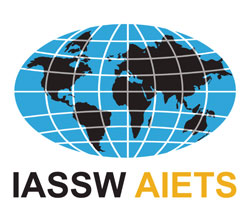Introduction:
Social work has a history of more than 100 years of addressing climate change issues, beginning with its acclaimed Nobel Laureate, Jane Addams who encouraged Italian immigrants in Chicago, USA, to recycle waste to clean up the environment and generate income in low-income communities marred by poverty. This work drew on that of the Settlement Movement in London, England, where environmental conditions included poor housing which left its inhabitants exposed to mould, damp, and the elements including flood waters. This tradition became the remit of community social workers following the advent of individual casework as social workers’ mode of working with communities, families and individuals experiencing structural inequalities. These were expressed as poverty, environmental degradation resulting from fossil fuel burning industries that discharged their wastes into local rivers, atmosphere and soils, polluting all they touched and engendering ill health – physical and mental, among residents.
This exhibition presents some recent activities in this regard through photographs that also tell their own stories.










Photo from Ms Gillian Freedland, Principal, Alva Academy









Environmental Justice at the heart of social justice
Social work’s motto of ‘the person-in-their-environment’ lost its connection to the physical environment when it was redefined as the social environment by Urie Bronfenbrenner’s (1979) socio-ecological theories of the mid-1960s. This orientation was challenged by environmental and ecological social work which refocused on the physical environment. Its key proponents in Canada, America, and Australia (Ungar, 2002; Besthorn, 2008; Alston, 2013), re-established the link between the physical environment and social systems. Alston also asserted the importance of gender in these deliberations. However, it was not until Dominelli’s (2012) publication of Green Social Work that the connection was made between the industrial model of social production in industry and agriculture, social issues, social systems, individuals and power relations that fostered structural inequalities including environmental racism and treated the earth as an entity to be exploited and its resources to be consumed with a destructive disregard of the consequences for the planet, the physical environment, its flora and fauna and humanity as a whole. Her trenchant critique insisted on alternatives to fossil fuel driven development, the global sharing and easy access to green technologies for the global South to develop sustainably and equitably, and the duty of people to care for the earth and all it contains.
Dominelli, motivated by the devastation of the 2004 Indian Ocean Tsunami sought to organise the profession into taking seriously ‘natural’ and (hu)man-made disasters through the International Association of Schools of Social Work (IASSW). The tsunami occurred at the end of her eight-year term as IASSW’s President. On 5 January 2005, she took a proposal entitled, Rebuilding People’s Lives After Disasters (RIPL), to IASSW’s Board for international action on the matter. The School of Social Work in Ljubljana, Slovenia became a key player in Sri Lanka. RIPL’s endeavours drew on research evidence and community-based practice projects enacted under the auspices of the interdisciplinary Institute of Hazards, Risk and Resilience, at Durham University in England. These included climate change and health and social care provision within the UK. With colleagues at the School of Social Work in (now) University College Copenhagen and the Danish International Federation of Social Workers (IFSW) and Danish International Council on Social Welfare (ICSW), she organised a side-event linked to the UNFCCC COP meeting in Copenhagen in 2009 and drafted the first climate change policy for the Boards of their international organisations to consider. These initiatives led IASSW to become accredited as a RINGO member at UNFCCC meetings in 2010. IASSW, ICSW and IFSW arranged to consult, discuss and agree with their constituents worldwide, a Global Agenda for Social Work and Social Development in 2010. One of its four pillars was environmental disasters which included climate change. Social workers reported their activities on this pillar at their joint conference in Seoul in 2016. Social work academics, practitioners and students have been undertaking a range of activities including practice projects ranging from assisting the formation of energy sufficient communities by facilitating access to renewable energy sources. For example, practitioners in the global South made available solar panels for heating and lighting and solar-powered stoves for cooking. IFSW invited IASSW to join its endeavours at Social Work Day at the United Nations, which at times covered climate change. In 2016, World Social Work Day through which IASSW and IFSW members together celebrate social work’s achievements locally across the globe highlighted environmental initiatives including those linked to climate change, social and environmental justice. Publications, curriculum development, and action-research projects provide avenues for preparing the next generation of practitioners, researchers and citizens to take seriously climate change, extreme weather events and other disasters. Much remains to be done for the profession to make consideration of climate risks, their prevention and mitigation, routine elements of theory and practice.
Conclusion
The global movement in transforming traditional education and practice has begun. This exhibition provides snapshots of some transformations that stand as testimony of how much more there is to do, even to make existing work more visible within the profession and without.
References:
Alston, M. (2013) ‘Environmental Social Work: Accounting for Gender in Climate Disasters’, Australian Social Work, 66(2): 218-233.
Besthorn, F. (2008) ‘Revisioning Environment: Deep Ecology for Education and Teaching in Social Work’, Journal of Teaching in Social Work, 22(1-2): 79-101.
Bronfenbrenner, U. (1979) The Ecology of Human Development: Experiments by Nature and Design. Cambridge, MA: Harvard University Press.
Dominelli, L. (2012) Green Social Work: From Environmental Degradation to Environmental Justice. Cambridge: Polity Press.
Ungar, M. (2002) ‘A deeper, more ecological social work practice’, Social Services Review, 76(3): 480-497.





